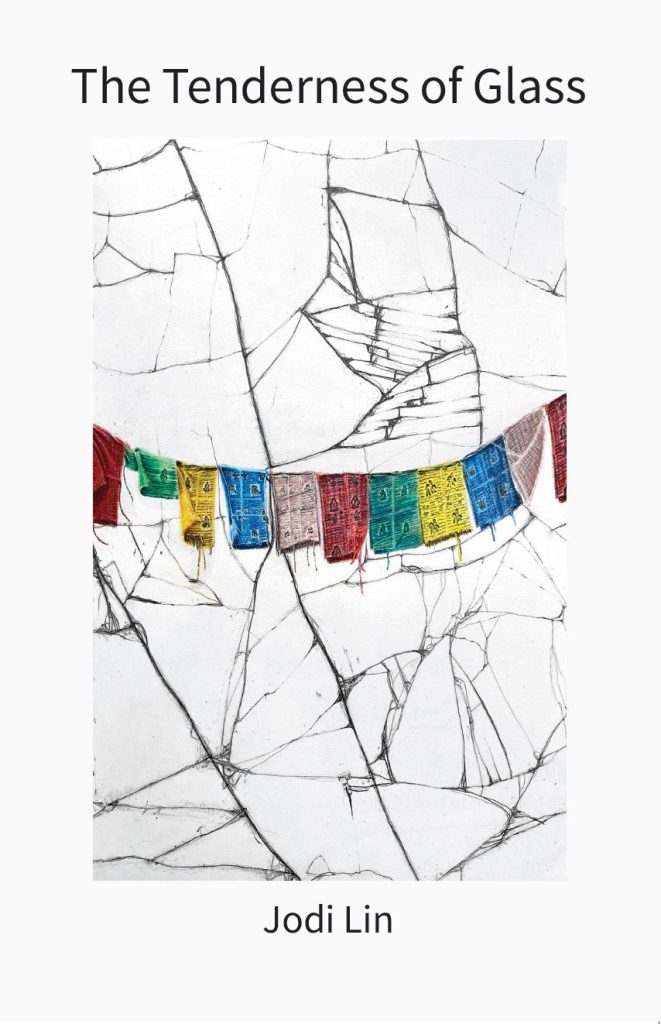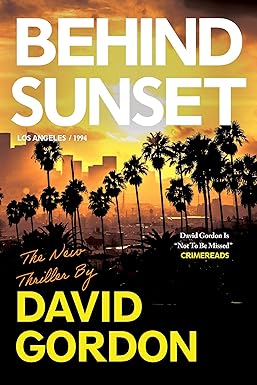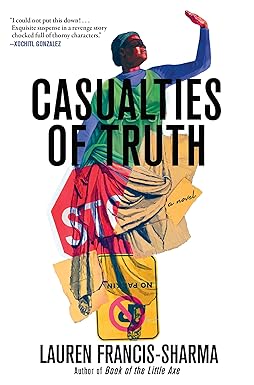Jodi Lin, The Tenderness of Glass. David Gordon, Behind Sunset. Lauren Francis-Sharma, The Casualties of Truth
By some mysterious coincidence, the last three books I’ve read were written by people I know. While dissimilar in subject, style, and voicing, these three books, all published this year, actually share much in their careful language and underlying scaffolding. All three are riveting mysteries with great storytelling, which tackle time and violence in unexpected ways. Witnesses. Bearing witness. With wit.
Jodi Lin, a close friend for over two decades, wrote The Tenderness of Glass (New Words {Press}), a non-traditional, intensely personal, lyrical work of prose and poetry. David Gordon, a recent acquaintance, wrote Behind Sunset (Mysterious Press), a satirical, noir, crime novel. This David Gordon is not to be confused with David Gordon, the choreographer, whom I’ve written about and whose life story I edited for his website. Lauren Francis-Sharma, whom I met at the Bread Loaf Writers Conference in 2019, wrote The Casualties of Truth (Atlantic Monthly Press), a cliffhanger that examines violence from the horrors of South African Apartheid of 1996 to Washington, D.C, 2018.



New York, NY: (New Words {Press}), 2025. ISBN: 978-1-968528-00-3
New York, NY: (Mysterious Press), 2025. ISBN: 978-1-61316-653-6
New York, NY: (Atlantic Monthly Press), 2025. ISBN: 978-0-8021-6378-3
Jodi Lin, The Tenderness of Glass (New Words {Press}), 2025
Jodi Lin’s book The Tenderness of Glass is, as Lin explains, “part memoir and part manifesto.” Though the book is only 97 pages, short enough to be read in one sitting, it packs a whollup. The author has us slip-sliding through centuries, drifting through continents, plunging through past lives and future loves. Written in six parts, each named after a Tibetan Buddhist Bardo, Jodi Lin takes us on a fractured, terrifying, and jubilant path that traverses the present, to the recent past, to being committed to Bellevue Psychiatric Hospital, to childhood trauma, back to a past life as Queen, married to King Genghis Khan.
In the Author’s Note, Jodi Lin writes, “Beginning with the ‘Bardo of Life,’ we follow the Goddess Palden Lhamo through the underworld to her next chosen body. The body she chooses is Jodi-transgender and native of the Pacific Islands, raised with abuse in the United States.” p. 97. Jodi hears voices, the main one being the voice of “their wiser self or wise mind.” As the narrator proceeds through time, we are treated to a treatise: “The Masters of Kaliyuga / Have left behind a legacy of violence / Of capital / of commerce / That humanity must bleed out.” p. 68. This is followed by its possible antidote: “Complicit, all of us. Past life accomplices to the crime that is love. We manifest love in this life, in the time of suffering—Kaliyuga. This is the prophecy. I am crazy but don’t kill me, not yet. I am the messenger.” p. 69.
Jodi Lin’s memoir also has moments of humor. In the “Bardo of Dreams,” Jodi has a breakdown and calls the police to report human skulls under the bed. “They came with the hazardous materials truck, expecting bodies, blood and carnage.” Not finding any, they went on to ask the standard questions. After not passing their tests, “They suggested I grab my coat. They suggested I grab my keys. An ID. I put on my fanciest coat with my fanciest hat. Handed my keys, phone, and ID to an officer as though she worked for me. And . . . I was escorted to an ambulance.” p. 25. It’s off to Bellevue Psychiatric with the author.
Exactly as its title suggests, this book is about hard truths, hard-won, shattered, yet delivered into the tender hands of the goddess, yet still of this moment, vivid and relevant. The mythic mysteries of the narrator in Jodi Lin’s book are reflected in the more traditional crime mysteries of David Gordon’s book.
David Gordon, Behind Sunset (Mysterious Press), 2025
This latest book, Behind Sunset, by David Gordon, writer of hard-boiled crime novels, including the Joe the Bouncer series, is more on the over-easy side. As The Tenderness of Glass crosses time, so does David Gordon in Behind Sunset, as he eyes the 1990’s of Los Angeles from today’s present. Behind Sunset is exciting, as his books usually are, funny, twistedly plotted, with plenty of sex and violence. However, this time, the narrator is not tossing people around or getting into extreme car chases; this time, he’s a college grad with an English degree. It’s 1990s Los Angeles and Gordon’s character, Elliot, is using his degree to work in his chosen field of publishing, but he’s relegated to working for a porn mag, a time just before the internet completely changes the field. Gordon relishes exposing Elliot’s porn writing, adding a wacky punk feel to the novel. In one issue of their mag, he had to write a bit about stills from a scandalous home video. “Ahoy, Mateys! Elliot’s copy blared. It’s yacht rock around the cock with buoyant beach babe Sindy and drummer hubby Hex, who shows off his stick work on this cooze and booze cruise!” p. 9.
The narrator’s true voice, a bit jazzier, pops up, as he, like Jodi Lin, considers capitalism. “For Elliot, work was war. Or rather, since it was all too obvious who’d won this class war, work was a kind of POW camp. You did what you had to do to survive, jumped and saluted, laughed at the commandant’s jokes and pledged allegiance, but in your heart, you remained an enemy and you kept up the struggle with what few weapons remained at your disposal: complaining, loafing, petty theft. Every illicitly licked stamp or pilfered pen was a tiny raise, each afternoon crossword session in the men’s room stall a triumph of the human spirit.” p. 4.
When that job ends, he finds himself embroiled in an equally unconventional industry, the wellness/spiritual world. These two career paths offer David Gordon an abundance of opportunities to use and abuse his love of satire and irony. He had direct knowledge of these worlds from his time in LA in the 90s, working in these industries, but the plot is pure David Gordon craziness, a wild hip-hop ride of identities and hidden pasts.
Occasionally, Elliot’s English degree shows through, often humorously. He remembers an ex-girlfriend: “Her letters—once passionate paeans to Shakespeare and Shelly, grew cooler as she moved on to Barthes and Butler, then harsher with Foucault, and finally, after an inscrutable note on Derrida–had stopped completely.” p29. This may not tickle all readers, but I was charmed. I know just enough to have a clue regarding these references, but not enough to parse the structural differences between Foucault and Derrida.
Towards the end of the book, Elliot goes back to New York City because his dad has had a stroke. When his dad regains consciousness, he speaks in German, remembering his time in the German death camps. It’s a terrifyingly dissonant note when Gordon juxtaposes the porn and wellness industries alongside this glimpse into the horror and evil of Nazi Germany, which plunges the book into a new level of depth and complexity. This brings us directly to Lauren Francis-Sharma’s book, which takes that investigation into new realms.
The Casualties of Truth by Lauren Francis-Sharma
Like Gordon’s work, The Casualties of Truth, Lauren Francis-Sharma’s book, has the excitement and terror of a crime novel, while itforces readers to consider what we think about violence, retribution, options. There’s a surrealist aspect to this work that oddly connects with Jodi Lin’s work as well, in its swirl of emotions and sensations, discordant and full of gaps. Prudence and her husband Davis are an upscale Black power couple, though not in politics, in Washington D.C. in 2018. Prudence’s world is shaken when Matshediso, a person she knew in Johannesburg when she was an intern attending the Apartheid trials, appears at dinner as her husband’s new colleague. Deeply held secrets from the past, not only from the Truth and Reconciliation Commission of 1996, but also another murder that begins the book, and a new test of her resolve and beliefs at its end, are dexterously woven together.
Like both Lin and Gordon’s work, the threads of the narrator’s personal life crisscross the weft of the larger political world in its unanswerable question of how to deal with the violence of others, the violence in ourselves, and the wish to be nonviolent. In the midst of ordinary, mundane life with kids and family jokes, the past, with its deaths and violence, rises up like a colossus. After a disturbance at the restaurant, Prudence thinks about her husband’s response: “And yet the one truth she understood about relationships is that the people closest to you were like the most lethal land mines, dormant, and just waiting for you to trigger them with your presumptions and your hubris. The fact that she had actually imagined that she could escape Davis’s full emotional fallout from the night seemed laughable in hindsight.” p. 132
Later, Lauren Francis-Sharma’s narrator ruminates: “Nothing ever remained the same, did it? There were terrorists now in graves with iron clenched between their fingers, there were strong fathers weeping and mothers wielding knives, and children in beds, their thoughts filled with new worries. One day you were healed, the next day you were wounded, one day you cannot remember, the next day your body marks each memory with a blistering pain. There were wondrous disappointments and also terrible surprises . . .“ p. 251.
This book weaves a rich tapestry of love and rage, kindness and evil, longing and grief, as do all three of these books that guide us through various ways of dealing with the mystery of life, the timelessness of living, and the death that awaits us all. As each witnesses their own lives, their own decades, they bear witness to our own lives in this present atmosphere of violence and hatred, and each wends for us a path towards a way to deal with it all—with love.
—Jan Schmidt
* * *
